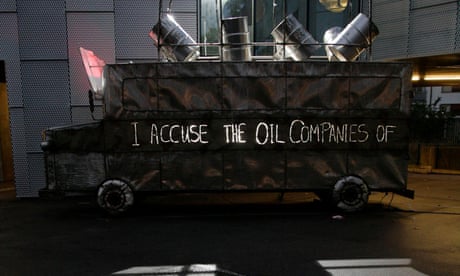
Twenty years after ‘judicial murder’, Nigeria’s Ogoni people highlight international storm over oil spillage pollution
The British artwork memorial to Ken Saro-Wiwa being held in Lagos. Photograph: Rex Shutterstock
Leaders of Nigeria’s Ogoni people have threatened to disrupt the country’s oil industry if the government does not release a British artwork commemorating the 20th anniversary of the execution of the writer Ken Saro-Wiwa.
The memorial, in the form of a large bus, has been impounded by customs in Lagos for six weeks because it is considered politically inflammatory. A quote from the writer on the side of the bus accuses the oil companies of “practising genocide against the Ogoni” .
Activists in Port Harcourt warned they would set up roadblocks and disrupt oil industry work if the bus were not released in time for the anniversary of Saro-Wiwa’s death on Tuesday.
“We shall mobilise people and begin a series of mass actions to seriously disrupt economic activities in the Ogoni areas of the Niger delta,” said a spokesman for the Movement for the Survival of the Ogoni People, which Saro-Wiwa founded in 1990.
I’ve seen Nigeria’s old power at work. I know change is coming

Read more
The author was hanged by a military court in 1995 following a peaceful uprising by 300,000 Ogonis against Shell’s widespread pollution in Ogoniland. The execution sparked international outrage, led to Nigeria’s suspension from the Commonwealth and has kept oil companies out of the region.
Saro-Wiwa’s son, also called Ken Saro-Wiwa, who worked as an adviser to the last Nigerian president, said Ogoniland was now on the world map and that oil companies were being held to account for not cleaning up decades of pollution.
“Climate change is the defining issue of the first half of the 21st century and the Ogoni story is a part of that,” he said.
“People are still very angry and emotional about the issues. The mistrust is very deep-seated. We see the global awareness of my father and Ogoniland, but that is little consolation to the communities still drinking water with 900 times the World Health Organisation accepted level of benzene.”
The anniversary of the execution of Saro-Wiwa and eight other Ogoni leaders, following a military court ruling which allowed no appeal, will be marked in London and Nigeria by vigils and church services.
Environment and human rights groups said the “judicial murder” of the Ogoni Nine marked the birth of a worldwide ecological justice movement in opposition to oil spills and human rights abuses.
Ken Saro-Wiwa’s execution aroused international condemnation. Photograph: Rex Shutterstock
“He was the start of a shift in the way the world understands oil,” said Nnimmo Bassey, director of Nigerian environment group the Health of Mother Earth Foundation and former chair of Friends of the Earth International.
“By standing up to the Nigerian government and to Shell he inspired people around the world. There are now many more voices and networks of groups holding Shell and oil companies to account.”
Allan Hogarth, Amnesty International UK’s head of advocacy, said: “Saro-Wiwa devoted his life to making the link between human rights and environmental struggle in the Niger delta.
“Tragically, the communities he defended are still blighted by oil pollution because of the continued failure of Shell and the Nigerian government. The fact is that the oil spills have not stopped and Shell still has not cleaned up the damage.”
Michael Liebreich, founder of Bloomberg New Energy Finance, said the execution of Saro-Wiwa focused attention on the need for reform of the global energy industry.
Ken Saro-Wiwa memorial art bus denied entry to Nigeria
Read more
“I am profoundly bothered when I see unfair, oppressive, society-harming actions by the energy industry,” he said.
“This goes back to 1995 when Saro-Wiwa was judicially murdered. I felt helpless. Now I do not. Back then it was impossible to envisage a different world. Back then, health, wealth and happiness were inextricably linked to fossil fuels and their attendant corrupt, corrosive centralisation of power. Now we know another way is possible.”
When Saro-Wiwa wrote the Ogoni Bill of Rights in 1990 it was intended to be a statement of self-determination.
But Nigerian activist Ken Henshaw said it has become a rallying call for indigenous movements around the world: “The spirit of the bill lives on as communities fight to make decisions about resource extraction on their lands to stop environmental destruction and respond to the climate emergency.”
Shell responded by saying it was aiming to clean up the backlog of oil spill sites in Ogoniland. “Despite not producing oil and gas in Ogoniland since 1993, the Shell Petroleum Development Company of Nigeria and its partners have been involved in a number of initiatives aimed at delivering a better future for this region.

“These include working with the federal government, communities and civil society on accelerating implementation of the 2011 United Nations Environment report; a remediation programme aimed at cleaning up the backlog of spill sites in Ogoniland as quickly as possible; and working with local communities to prevent oil theft and sabotage, which continue to cause environmental damage.”










No comments:
Post a Comment